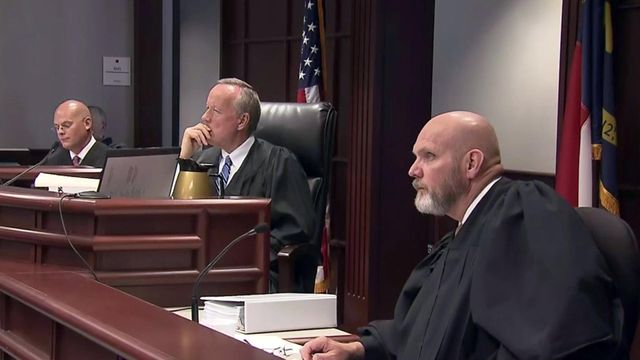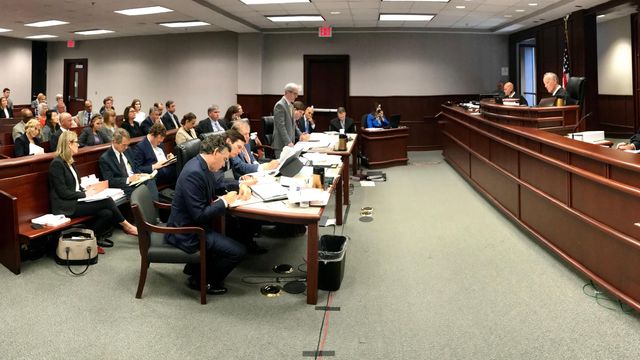Judges skeptical of challenges to proposed amendments
A panel of three Superior Court judges on Wednesday ordered state elections officials to hold off printing ballots for the November election until the courts could weigh in on challenges brought by Gov. Roy Cooper to two proposed constitutional amendments.
Posted — Updated"A ballot question that does not fairly and accurately present [what it does] amounts to a deceit on the people of North Carolina, and it corrodes and, I suggest, it corrupts their right to amend their constitution," said John Wester, an attorney for Cooper. "This cannot become the law of our state."
The two proposals use "feel-good phrasing" to encourage voters to approve them, Wester said, when state law requires that amendment language be fair and non-discriminatory.
The judicial vacancies amendment, for example, calls for "a nonpartisan, merit-based system that relies on professional qualifications instead of political influence." But Adam Doerr, an attorney for Cooper, noted that lawmakers would have the power to appoint anyone they want to the bench and that the only qualifications the state requires for someone to be a judge are that they are a licensed attorney under the age of 72.
"What [the amendment} is actually doing is letting the General Assembly exercise political influence over judicial selection that it currently lacks but would very much like to have," Doerr said.
Similarly, the appointments amendment calls for "clarify[ing] the appointment authority of the Legislative and the Judicial Branches," as if,
Doerr said, it was merely "a bit of legislative housekeeping." He said the state Supreme Court has clearly laid out the appointment powers of the governor, so no clarification is needed.
Judge Thomas Lock of Johnston County asked how misleading would the amendment language have to be to be unconstitutional.
"If you want to seek the consent of the voters to amend the constitution, you must ask them and you must tell them what you are doing," Doerr responded.
Martin Warf, a lawyer for legislative leaders, argued there's no standard for what is misleading and that lawmakers are under no constitutional duty to inform voters about the amendments on the ballot. Voters who want to know more about them, he said, can do research.
"The constitution of North Carolina does not permit what plaintiffs are asking this court to do," Warf said, suggesting the courts would upset the balance of power in state government by blocking the proposals from appearing on the ballot.
"These amendments are not misleading, but the people deserve the right to review them," he said.
Judges Forrest Bridges of Cleveland County and Jeffrey Carpenter of Union County questioned what harm would there be by letting the amendments remain on the ballot and dealing with any constitutional issues after that.
"Even if we agree that there are problems with the proposed amendment questions, why shouldn't we sit back, let the election take place and then look at it afterwards?" Bridges said.
"The struggle we're going to have determining what the irreparable harm is if the voters say, 'No, we're not going to change it,'" Carpenter said. "There is the potential of irreparable harm, but we don't know."
Solicitor General Matt Sawchak, who represents the State Board of Elections and Ethics Enforcement, rejected that idea, saying it's difficult to undo votes after the fact.
"Courts are understandably hesitant to undo the results, to essentially tell the people, 'You know those votes you just cast, by judicial order, they actually don't count for anything,'" Sawchak said.
Bridges said that, if the dispute between Cooper and the lawmakers were an ordinary civil lawsuit, he would recommend the two sides go into a room and work out a compromise.
"Why shouldn't there be some discussion?" he said. "Y'all agree on some language that everybody thinks is fair and objective. There's got to be a way to formulate language that everybody agrees will do exactly what the objective is in this case, and that is to submit vote to the will of the people without spin, without propaganda, without twisting in any way."
Matt Abee, an attorney for legislative leaders, said that argument fails because courts have allowed lawmakers to operate under the unconstitutional maps. Also, using the "nuclear option" of declaring the General Assembly to be operating illegally would undo hundreds of laws passed over the past year or so, he said.
Sawchak said the elections board ideally needs to have the issue settled by Friday so that it has three weeks to prepare the ballots before a Sept. 7 target to start mailing ballots to absentee voters overseas. Given that any decision the panel makes will likely be appealed to the state Supreme Court, he said, the absolute deadline to resolve the case is Sept. 1, which would put the state up against a 45-day period for absentee voting required by federal law.
The three-judge panel said, pending its decision and whatever the Supreme Court decides, the elections board shouldn't print any ballots before Sept. 1.
• Credits
Copyright 2024 by Capitol Broadcasting Company. All rights reserved. This material may not be published, broadcast, rewritten or redistributed.






